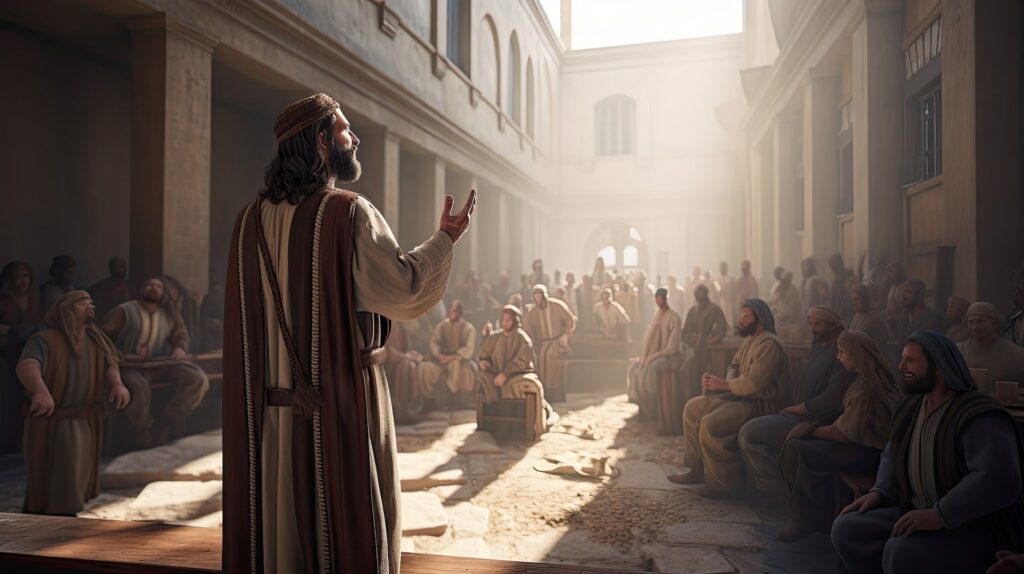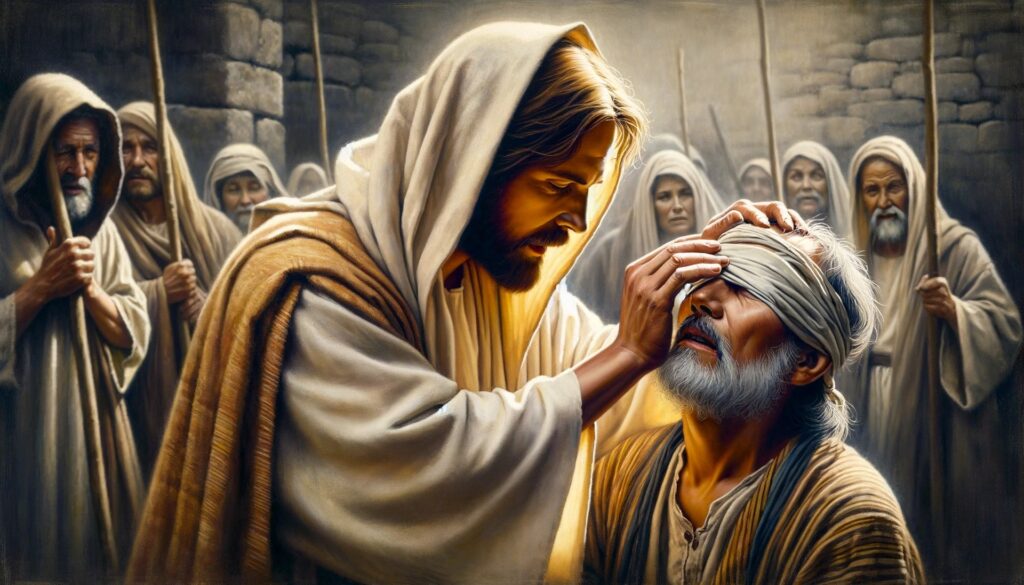Mark 8:1-38 King James Bible KJV

The Pharisees Demand a Sign, Healing of the Blind Man at Bethsaida, Peters Confession, Jesus Predicts His Death
Mark 8:1-38 King James Bible KJV. Mark Chapter 8 is a turning point in the Gospel, revealing key aspects of Jesus’ identity and mission. It emphasizes the gradual understanding of his disciples, who are beginning to grasp that Jesus is the Messiah, but who still struggle to accept that his messianic role involves suffering and sacrifice.
The chapter also presents the cost of discipleship, calling believers to follow Jesus in self-denial and embrace the way of the cross. At its core, this chapter challenges both the disciples and readers to understand that true faith involves not only recognizing Jesus’ identity but also accepting the path of sacrifice that comes with following him. Its key themes include:
Spiritual Perception and Growth: The chapter highlights the theme of partial understanding. The healing of the blind man in two stages is symbolic of the disciples’ gradual spiritual enlightenment. Initially, they see “people… like trees walking,” reflecting their incomplete grasp of who Jesus truly is. As the chapter progresses, Peter’s confession that Jesus is the Messiah shows growing awareness, but his rejection of Jesus’ prediction of suffering reveals the disciples’ continuing misunderstanding of the Messiah’s true mission.
The Messiah’s Mission: Jesus’ prediction of his suffering, death, and resurrection is central to the chapter’s meaning. The Jewish expectation of a Messiah was often linked with political liberation and earthly power. However, Jesus introduces the idea that his mission involves suffering and sacrifice. Peter’s rebuke shows the difficulty people had in accepting a suffering Messiah, which contrasts with Jesus’ teaching that his kingdom is not about human power but about divine salvation through suffering.
Discipleship and Self-Denial: Jesus teaches that following him requires self-denial and taking up one’s cross. This means that discipleship is not just about recognizing Jesus as the Messiah but being willing to follow him in suffering, sacrifice, and service. It’s a call to give up personal ambitions and align with God’s purposes, even if that means facing hardship or death. Jesus emphasizes that true life is found not in self-preservation, but in losing one’s life for his sake and the gospel.
Mark 8:1-38 King James Bible KJV
—————-
The Feeding of the Four Thousand – verses 1-10
This miracle is similar to the feeding of the five thousand but occurs in a Gentile region, indicating that Jesus’ ministry extends beyond the Jews to all people. The miracle shows Jesus’ compassion and divine power, while also revealing the disciples’ slow understanding, as they again question how so many can be fed with limited resources. Jesus is the provider, meeting both physical and spiritual needs. The feeding of Gentiles shows the inclusivity of God’s kingdom, while the disciples’ doubts underscore their incomplete understanding of Jesus’ mission.

The Pharisees Demand a Sign – verses 11-13
The Pharisees ask for a sign from heaven, but Jesus refuses, knowing their request comes from unbelief and a desire to test him. Jesus’ refusal indicates that faith is not built on miraculous signs alone but on recognizing and trusting God’s work. True faith doesn’t demand proofs from God but trusts in what has already been revealed. The Pharisees’ hard-heartedness contrasts with those who have faith, even with limited understanding.
The Leaven of the Pharisees and Herod – verses 14-21
Jesus warns his disciples about the “yeast” of the Pharisees and Herod, representing their spiritual blindness and unbelief. The disciples, however, misunderstand this as a literal concern about bread, showing their lack of comprehension despite witnessing miracles like the feeding of the multitudes. Spiritual blindness is a danger, even for the disciples. Jesus calls them to be aware of influences that can cloud their faith, such as the legalism and skepticism of the Pharisees and the worldly concerns of Herod.

Healing of the Blind Man at Bethsaida – verses 22-26
Jesus heals a blind man in two stages—first, the man sees people like “trees walking,” and then his sight is fully restored. This gradual healing parallels the disciples’ spiritual journey, as they begin to see but don’t yet fully understand Jesus’ identity and mission. The miracle illustrates that spiritual sight can come gradually. It symbolizes the disciples’ incomplete understanding of Jesus, which will be further clarified as the gospel unfolds.
Peter’s Confession and Jesus’ Prediction of His Death – verses 27-33
When Jesus asks his disciples who people say he is, Peter declares, “You are the Messiah.” This is a turning point, revealing that the disciples are beginning to recognize Jesus’ true identity. However, when Jesus predicts his suffering, death, and resurrection, Peter rebukes him, showing that Peter misunderstands the nature of Jesus’ messiahship. Peter’s confession shows a growing awareness of Jesus’ identity, but his rebuke demonstrates that he, like many others, expects a conquering political Messiah, not a suffering servant. Jesus’ response, calling Peter “Satan,” reveals that opposition to God’s plan—even from well-meaning disciples—can hinder God’s redemptive purpose.

The Cost of Discipleship – verses 34-38
Jesus teaches that following him involves self-denial, taking up one’s cross, and being willing to lose one’s life for the sake of the gospel. He contrasts earthly, self-centered goals with eternal values, declaring that gaining the world at the cost of one’s soul is futile. Discipleship is not about personal gain or worldly success; it requires sacrifice and a willingness to follow Jesus’ example of suffering and humility. True life is found not in self-preservation but in giving one’s life for Christ. Jesus’ words also serve as a warning about the eternal consequences of rejecting him in pursuit of worldly gain.
Mark 8:1-38 King James Bible KJV
1 In those days the multitude being very great, and having nothing to eat, Jesus called his disciples unto him, and saith unto them,
2 I have compassion on the multitude, because they have now been with me three days, and have nothing to eat:
3 And if I send them away fasting to their own houses, they will faint by the way: for divers of them came from far.
4 And his disciples answered him, From whence can a man satisfy these men with bread here in the wilderness?
5 And he asked them, How many loaves have ye? And they said, Seven.
6 And he commanded the people to sit down on the ground: and he took the seven loaves, and gave thanks, and brake, and gave to his disciples to set before them; and they did set them before the people.
7 And they had a few small fishes: and he blessed, and commanded to set them also before them.
8 So they did eat, and were filled: and they took up of the broken meat that was left seven baskets.
9 And they that had eaten were about four thousand: and he sent them away.
10 And straightway he entered into a ship with his disciples, and came into the parts of Dalmanutha.

11 And the Pharisees came forth, and began to question with him, seeking of him a sign from heaven, tempting him.
12 And he sighed deeply in his spirit, and saith, Why doth this generation seek after a sign? verily I say unto you, There shall no sign be given unto this generation.
13 And he left them, and entering into the ship again departed to the other side.
14 Now the disciples had forgotten to take bread, neither had they in the ship with them more than one loaf.
15 And he charged them, saying, Take heed, beware of the leaven of the Pharisees, and of the leaven of Herod.
16 And they reasoned among themselves, saying, It isbecause we have no bread.
17 And when Jesus knew it, he saith unto them, Why reason ye, because ye have no bread? perceive ye not yet, neither understand? have ye your heart yet hardened?
18 Having eyes, see ye not? and having ears, hear ye not? and do ye not remember?
19 When I brake the five loaves among five thousand, how many baskets full of fragments took ye up? They say unto him, Twelve.
20 And when the seven among four thousand, how many baskets full of fragments took ye up? And they said, Seven.
21 And he said unto them, How is it that ye do not understand?

22 And he cometh to Bethsaida; and they bring a blind man unto him, and besought him to touch him.
23 And he took the blind man by the hand, and led him out of the town; and when he had spit on his eyes, and put his hands upon him, he asked him if he saw ought.
24 And he looked up, and said, I see men as trees, walking.
25 After that he put his hands again upon his eyes, and made him look up: and he was restored, and saw every man clearly.
26 And he sent him away to his house, saying, Neither go into the town, nor tell it to any in the town.

27 And Jesus went out, and his disciples, into the towns of Cæsarea Philippi: and by the way he asked his disciples, saying unto them, Whom do men say that I am?
28 And they answered, John the Baptist: but some say, Elias; and others, One of the prophets.
29 And he saith unto them, But whom say ye that I am? And Peter answereth and saith unto him, Thou art the Christ.
30 And he charged them that they should tell no man of him.
31 And he began to teach them, that the Son of man must suffer many things, and be rejected of the elders, and of the chief priests, and scribes, and be killed, and after three days rise again.
32 And he spake that saying openly. And Peter took him, and began to rebuke him.
33 But when he had turned about and looked on his disciples, he rebuked Peter, saying, Get thee behind me, Satan: for thou savourest not the things that be of God, but the things that be of men.

34 And when he had called the people unto him with his disciples also, he said unto them, Whosoever will come after me, let him deny himself, and take up his cross, and follow me.
35 For whosoever will save his life shall lose it; but whosoever shall lose his life for my sake and the gospel’s, the same shall save it.
36 For what shall it profit a man, if he shall gain the whole world, and lose his own soul?
37 Or what shall a man give in exchange for his soul?
38 Whosoever therefore shall be ashamed of me and of my words in this adulterous and sinful generation; of him also shall the Son of man be ashamed, when he cometh in the glory of his Father with the holy angels
1 thought on “Mark 8:1-38 King James Bible KJV”
You must be logged in to post a comment.